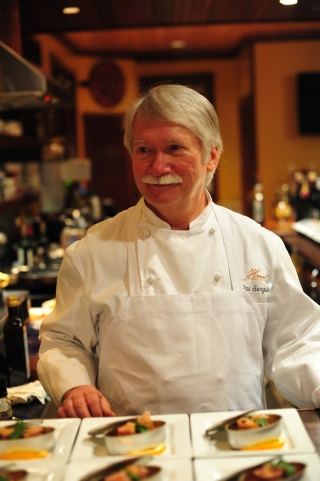
Hands-on Training During the Pandemic
01 March 2021Pivoting from feeding on-campus restaurant goers to feeding the food insecure.
By Paul Sorgule, MS, AAC
There IS no shortage of challenges facing those of us in culinary education during these unprecedented times. One major challenge and opportunity is how to provide for our students the sense of urgency, the need for effective organization and planning, and the impact of a guest experience when campus restaurants may be closed. We are aware that learning to cook is only half the battle. The experience of learning to cook when the pressure is on and when multiple guests are waiting in anticipation of a meal leads to competence and confidence. So, what is the solution?
Months ago, Jose Andres through his World Central Kitchen initiative identified funding for restaurants to partially overcome their lack of business and inability to accept in-house guests by transitioning his staff to the preparation of meals for those in the community who were food insecure. It may not have driven profit to the bottom line, but it helped secure positions for staff members while servicing a real need in their communities. This is a noble effort toward the survival of community members and neighborhood restaurants as well.
Chef Jose Andres, as we are all aware, has dedicated a considerable amount of time away from his restaurants in an effort to mobilize chefs to feed those in need. Whether from natural disasters, economic challenges, or political oppression – Andres through his World Central Kitchen is there to cook. One of his current initiatives is Restaurants for the People which has zeroed in on addressing the needs of restaurants to survive and people to find the meals to support family health and wellbeing. This has resulted in the introduction of the FEED ACT (FEMA empowering essential deliveries) to Congress. Supported by President Biden, if approved this Act will fund his Restaurants for the People Initiative.
In a Washington Post article “Put Restaurants to Work Feeding the Hungry” shared with me by Gold Medal Classroom Editor Lisa Parrish, Mark Bucher, owner of the Washington D.C. restaurant Medium Rare, talks about his initiative called Feed the Fridge. Through his non-profit “We Care Inc” the Feed the Fridge program focuses on finding funds to support restaurants that are re-directing their efforts toward the provision of meals for those who are food insecure.
There are some culinary arts educational programs taking this lead too. Diablo Valley College Culinary Arts Programs in Pleasant Hill, Calif., transitioned from serving 300 customers per day in their student-run food outlets to supporting 800 food-insecure campus families through their food pantry. The college has adjusted their programs to address COVID-19 challenges.
An article, “How California community college vocational programs have adapted to COVID-19,” describes how students and faculty members have collaborated to maintain a hands-on focus while supporting those in the community who are in need. Chef Squire Davidson and his faculty team have made lemonade out of lemons as this article explains.
If more colleges adapted to feeding the food insecure, students could learn:
- quantity preparation techniques
- the application of nutritious cooking
- how to plan for predictable volume
- ways chefs can connect with the community
- the power of giving and the power of food to unite
At the same time, the cost of delivering these skills and experiences could be covered, at least partially, through grants and, if approved, the FEED Act.
I would encourage program Directors and Deans to investigate World Central Kitchen. Challenging times require creative solutions and this is what chefs do best.
PLAN BETTER – TRAIN HARDER
Note: Thanks to Gold Medal Classroom Editor Lisa Parish for providing a spark of inspiration for this article.
Paul Sorgule, MS, AAC, president of Harvest America Ventures, a mobile restaurant incubator based in Saranac Lake, N.Y., is the former vice president of New England Culinary Institute and a former dean at Paul Smith’s College. Contact him at This email address is being protected from spambots. You need JavaScript enabled to view it..
